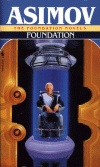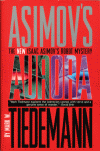William Gibson is credited with starting the cyberpunk genre when he wrote Neuromancer. I’ve had this book on my mental list of books to read for many years now, but hadn’t managed to squeeze it into my reading schedule until now. I’m a bit disappointed that it took me so long to get to, because it was a very enjoyable read.
The setting of Neuromancer is kind of a dirty futuristic world where the line between man and machine has been blurred. Almost everyone has some type of enhancement ranging from boosted reflexes to special chips that let another person experience all of someone else’s senses. Hackers are referred to as “Cowboys,” who jack into the matrix which is a graphical representation of the electronic world. This matrix is much different than that of the 1999 movie The Matrix in that it is not a copy of the real world. I can best describe as a hallucination that represents the underlying systems that are all connected together. Many of the information systems are protected by AI of varying degrees of complexity.
The main character, Case, is an ex cowboy that got caught stealing from his employer. They fried his nervous system so that it was impossible for him to jack into the matrix, effectively crippling the only way he knew how to make money at the time. After failing to find a cure for the damage done to him, he started to break into the crime scene of Chiba City outside of Tokyo. He hated being trapped inside “meat,” preferring the freedom of the Matrix. Case turned to drugs, financed by his dirty deals, as a way to escape. Although he was doing pretty well for himself as a criminal in the real world, he eventually stopped taking precautions to stay alive. His actions didn’t go unnoticed.
A highly modified woman named Molly hunts Case down and brings him to a man named Armitage. He has been monitoring Case for a while. His profile describes Case’s suicidal tendencies. Armitage promises to have doctors fix Case’s damage if he will help with a huge hacking operation that is being planned. Case agrees, only to find out afterward that poison sacks have been implanted in his body as insurance to make sure he doesn’t take off before the job is completed. After that, he’ll be free to jack into the Matrix and pick up where he left off.
Gibson weaves a very complex plot that at some points is hard to follow. I found myself rereading sections, particularly those describing events taking place in the Matrix. Many events don’t really make sense until more information is revealed later on in the story. I have a feeling that reading this book a second time down the road would be beneficial. Overall, the action is engaging and Gibson’s particular description of cyberspace is fascinating. This book has definitely rekindled my interest in the cyberpunk genre.



